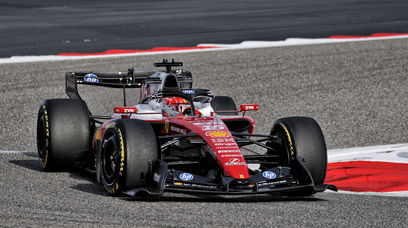Sunday
My early morning drive from Menton to Monaco is quick and painless, but once in the media centre I hear horror stories from colleagues who commute by train: Saturday evening they'd been forced to endure hour-long queues at the local station due to insufficient trains. I hear later there were similar issues on race day on in- and outbound trains, whether travelling west towards Nice or east towards Italy. Monaco suffers two issues: the infrastructure around the principality is French, and there is massive rivalry between the two independent Francophone states; indeed, I've heard that French authorities and trade unions schedule road works and suchlike and airport strikes to clash with Monaco Grand Prix weekend. If untrue, the local region is badly served by coincidence… The second cause is F1's rocketing popularity, not least because fans were starved of live action for two years under Covid. Thus, they are now packing circuits to see the improved action facilitated by new era regulations and a rich seam of young talent coming through. In short, as we saw in Barcelona a week ago and again in Monaco, prevailing circuit infrastructures are unable to handle a sudden influx of capacity crowds. While there is little or nothing money can't fix, as F1's commercial rights holder Liberty Media ups hosting fees – which in turn flow into NASDAQ shareholder pockets - so promoters and the local authorities who fund races have less funding to invest in facilities. While it can be argued that it’s a 'good problem' to have, the fact is it's F1's problem as a whole – and fans are being treated abysmally in return for their passion.
During my paddock rounds I spy former Lotus team boss-turned French GP promoter Eric Boullier, who tells me Circuit Paul Ricard, which suffered horrific traffic issues in 2018, will reduce access to 7500 cars per day, with passes issued to F1 personnel and VIP guests only. Fans will be shuttled to the circuit by fleets of busses and via special TGV trains operating from major centres. The system cost "many millions", he says, but he admits the race is out of contract this year and unlikely to survive unless it accepts a rotating deal. In both previous Monaco diary editions I referenced the upcoming Ivan Capelli and Stewart biopics, and today I hear of another: former FIA president and champion co-driver Jean Todt being the subject of a movie titled "Le Metodt", a play on 'His Method'. It should be out later this year. Talking FIA, it's clear the relationship between FIA and F1 is not what it was, with a distinct undercurrent flowing through the paddock. Historically there have always been strong personal and historic bonds between the FIA president and F1 CEO – witness Max Mosley/Bernie Ecclestone and Jean Todt/Ecclestone, then later Todt/Stefano Domenicali and Ross Brawn, both of whom worked for Todt at Ferrari.
But there is little in common between the administration of Mohammed Ben Sulayem and that of US-owned F1 headed by Domenicali, and this clash of cultures stands to harm unless brought under control. The irony is, of course, that F1 has never been more popular – which could also be the reason for the squabbles… Shortly before race-start, I chat with Marc Surer, my go-to F1 driver for 70s/80s F1 stuff, to learn more about the ground effects cars of his era and his memories of 'porpoising' - which is far from a new phenomenon, having first surfaced then. We’ll be publishing his recollections in due course, but suffice to say, he recalls bouncing being that bad that the front wheels lifted clean off the track! Upon returning to my desk there's a note to report to the reception area where a gift awaits: permanently accredited journalists are given a copy of the handy 'red book' containing facts and figures going back to 1950. Philip Morris previously sponsored the annual publication, but a new benefactor was needed after the company ceased being Ferrari's primary partner and the Automobile Club de Monaco kindly took over.
After a quick 2pm lunch at Pirelli, it's time to head for the grid, which is jam-packed although I manage to catch up with some folk: Eddie Jordan, Flavio Briatore and Felipe Massa amongst them. With 15 minutes to go, the first drops fall so I rush to the media centre, making it as rain starts. I wonder how new race director Eduardo Freitas will handle the situation, and the answer is not long in the coming: delay, then another. The official reason given (after the race) is that the drivers had not driven a wet session in Monaco – but they all have driven these cars on these tyres in rain and have all driven Monaco at some stage, so where is the issue with starting a race in the wet? We are, after all, talking about the world’s best drivers - post-race, the true racers, including Lewis Hamilton, lamented the decision. I fear 'safety' is now the catch-all clause for poor decisions…
Most read







